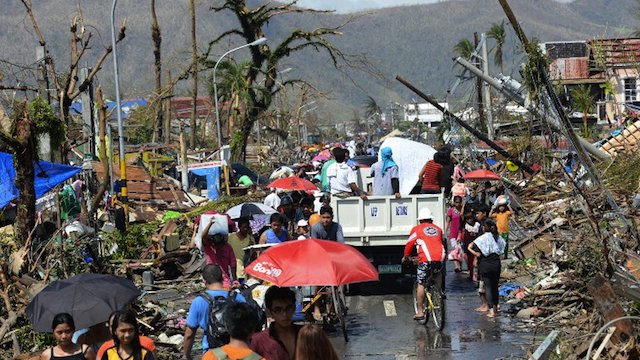SUMMARY
This is AI generated summarization, which may have errors. For context, always refer to the full article.

MANILA, Philippines – Much has been said about how local and national government have responded to the aftermath of Super Typhoon Yolanda (Haiyan) in the Philippines.
But as far as an international disaster expert is concerned, the recovery has been relatively “quick.”
Speaking at the sidelines of the launch of Smart/PLDT’s Mobile Cash Transfer forum, United Nations Development Programme (UNDP) Senior Recovery Advisor Yuri Afanisiev was all praises for what he called a quick response to the calamity.
“We are speaking of livelihood recovery and restoration 3 weeks after [Yolanda],” said Afanisiev.
He added: “I actually believe the Philippines has the potential to become a poster child for resilience and disaster preparedness in the world because you experience it every year.”
Government criticism
The government was under fire for the slow trickle of relief and aid in the aftermath of the strongest storm in history to make landfall. It took weeks before aid was brought to make areas devastated by the typhoon. Up to three weeks after the storm, the dead bodies still coexisted with survivors.
Afanisiev admitted that while “there is no excuse” for the delay in relief, critics cannot discount the logistical issues and extend of damage that led to the delays. “We’re still collecting dead bodies and families cannot begin to close until they bury their loved ones,” he added.
Still, compared to other disasters, Afanisiev told Rappler that the Philippines’ response has been impressive. “In Banda Aceh, it’s still ongoing. Although largely it’s finished by now but it’s been 8 years,” he told Rappler.
Banda Aceh in Indonesia was devastated in 2004 after a huge tsunami hit the area.
Criticism mounted after President Benigno Aquino III and Tacloban Mayor Alfred Romauldez, whose city was among those worst-hit by Yolanda, traded barbs over the local government’s “unpreparedness” in facing the super typhoon.
Slow climb up
Going back to “normal” has long been a battle cry of officials, local and national alike.
Afanisiev is quick to admit it will take a long time before “normal” comes back. “Let’s not give people false expectations that people will bounce back in 6 months,” he said.
He expects “basic functions,” including commerce in devastated areas to be back in 3 or 4 months time. On December 8, it will be exactly a month after Yolanda wreaked havoc on the Visayas and other parts of the Philippines. At least 5,000 died due to the storm.
Rehabilitation head and former Senator Panfilo Lacson said he hopes to finish the job by June 2016. Afanisiev was more conservative in his estimates. “Significant effort and result can happen within the timeframe,” he said.
But while talks of rehabilitation and “normalcy” start in Manila and other parts of the Philippines, some Yolanda survivors have yet to even think of the concept.
In a barangay (village) in Tacloban, bodies remain uncollected weeks after the storm. “We’re still collecting dead bodies and families cannot begin to close until they bury their loved ones. But it is my expectation that this will be done, literally within a few short weeks,” Afanisiev said.
‘How it should be done’
What impressed Afanisiev the most, he said, was how different sectors came together in the aftermath of the storm. During the forum, private business owners spoke of the importance of jumpstarting the economy in communities left in ruins by Yolanda.
“I think it’s a credit to the whole Philippine society because you have everybody coming together,” said Afanisiev.
Aside from Smart and PLDT’s Mobile Cash Transfer Program, other private companies have also reached out to small business owners to discuss loans and reintroducing the supply chain in affected areas.
But as families and communities continue to struggle day after day, only tomorrow can tell if discussions made in boardrooms will eventually translate to progress on the ground. – Rappler.com
Add a comment
How does this make you feel?
There are no comments yet. Add your comment to start the conversation.